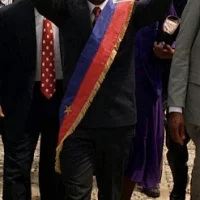President Richard Nixon ordered plans for retaliatory bombings of North Vietnam after talks to end the war in Vietnam broke down December 13, 1972. Operation Linebacker II, otherwise known as the “Christmas Bombings,” began December 18 and lasted for two weeks. A total of 741 B-52 sorties were dispatched, dropping 20,000 tons of bombs on… Read More "Bombing North Vietnam into Accepting Our Concessions: Christmas Bombings, 1972"
Play it again, Anne: Casablanca’s First Female Consul General
While America was evolving into a more gender-equal society at the end of the last century, conflicts could arise when female Foreign Service officers went abroad to lead diplomatic missions in countries whose foreign contacts were not used to seeing women in positions of authority. This sometimes led to uncomfortable situations. It was the perseverance, forbearance… Read More "Play it again, Anne: Casablanca’s First Female Consul General"
Haiti has long been plagued by coups d’état and regime changes, leading to long-time political instability and weak governance. In this volatile political field, it was easy for a Haitian leader to assume dictatorial powers, as was the case with President François Duvalier, also known as “Papa Doc.” After becoming the President of Haiti in… Read More "The Overthrow of Haiti’s Aristide"
Lesley Dorman and the Founding of FLO
Lesley Tanburn Dorman devoted her life to her own family and to her wider family – the Foreign Service. Her work to help the families of Foreign Service Officers contributed to the creation of the Family Liaison Office (FLO) at the State Department. Born in England, she met her husband Philip in London, where he… Read More "Lesley Dorman and the Founding of FLO"
Establishing an Escape Network in Post-War Hungary
Throughout most of World War II, Hungary operated in conjunction with the Axis Powers and actively contributed to the Nazi war effort under the leadership of Miklós Horthy. While invading Soviet troops had pushed out the occupying German forces by April 1945, the newly established Russian presence quickly posed a precarious threat to Hungarian stability… Read More "Establishing an Escape Network in Post-War Hungary"
The Siberian Seven: Escaping Religious Persecution in the U.S.S.R.
From its inception, the Soviet Union became the first state in the world to actively attempt to eliminate religion from society. Religion was viewed by Soviet leadership as counter-intuitive to scientific reason and as a threat to the consolidation and exertion of state power. Correspondingly, under Soviet religious policy, tens of thousands of houses of worship… Read More "The Siberian Seven: Escaping Religious Persecution in the U.S.S.R."

